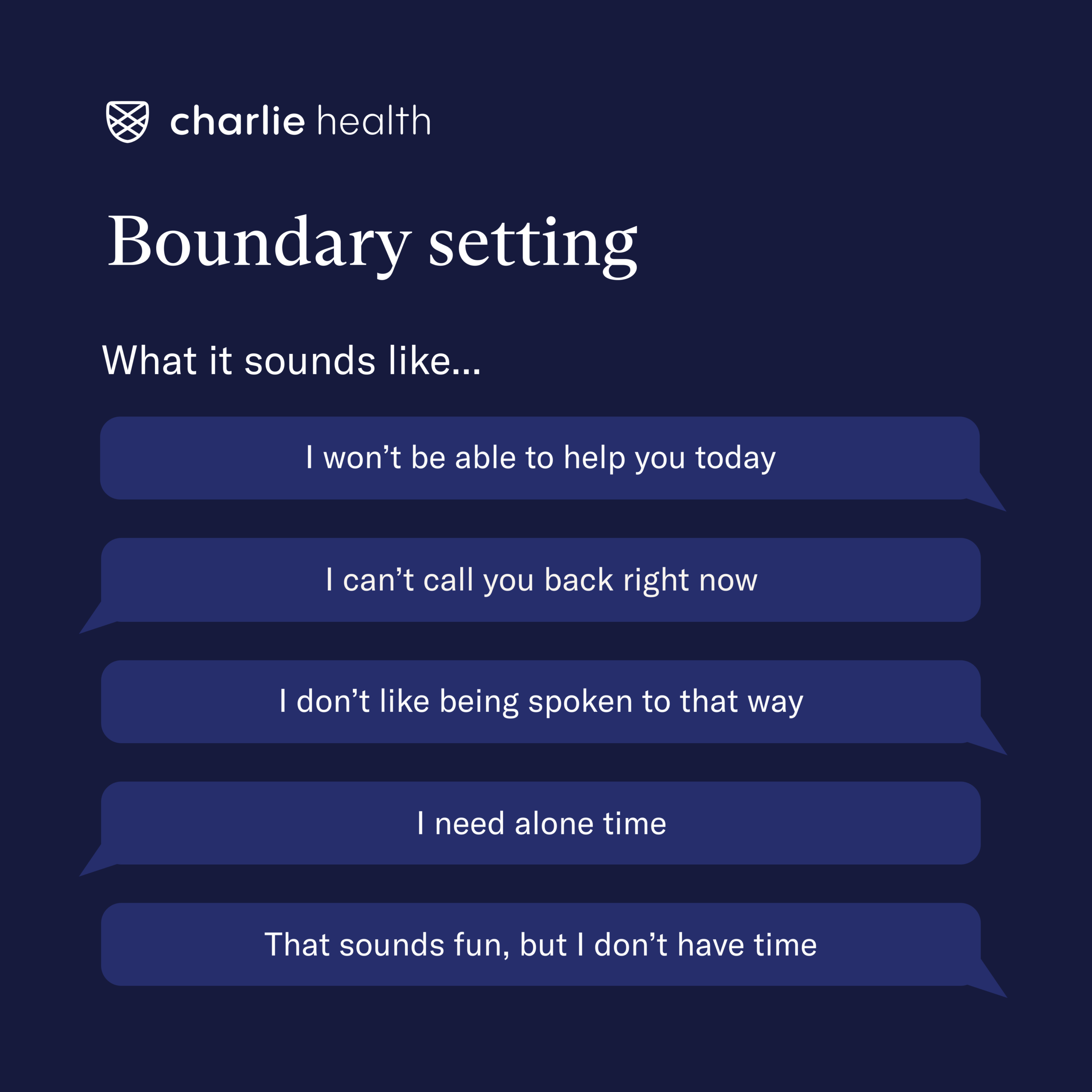
Table of Contents
How to Set Healthy Boundaries

Written By: Sarah duRivage-Jacobs

Clinically Reviewed By: Dr. Don Gasparini
Updated: September 12, 2023
9 min.
Are the boundaries in your relationship more controlling than they are helpful? Here’s what you need to know about healthy boundary setting in relationships.
Learn more about our Clinical Review Process
Table of Contents
Brené Brown, a researcher and writer famous for her work on shame and vulnerability, wrote that “daring to set boundaries is about having the courage to love ourselves, even when we risk disappointing others.” As Brown says, boundary setting in relationships is an important act of self-love. But setting boundaries is also good for the relationship. Whether you’re thinking about a romantic relationship, friend, or family member, clearly defined boundaries will help you navigate situations with mutual respect and kindness.
However, not all boundaries are created equal. Certain boundaries, whether intentional or not, may reinforce unhealthy patterns in relationships. As mentioned, a healthy boundary is mutually respectful, whereas an unhealthy boundary involves controlling or manipulating someone or setting up unreasonable expectations virtually no one can live up to.
Keep reading to learn what you need to know about setting healthy boundaries in a relationship, and how to make sure the boundaries are reasonable for and respectful of your partner, friend, or family member.
How to set healthy boundaries in a relationship
As with anything related to relationships, there’s no exact list of steps to follow when setting boundaries. However, we have a few recommendations for where to begin the process of understanding your boundaries, defining them for yourself, and communicating them with others. Here are some steps to keep in mind to set healthy boundaries in a relationship.
1. Reflect on what you need and want from your relationship
Very rarely are relationship boundaries clear lines in the sand that everyone is aware of. More often than not, people in relationships need to reflect on their personal limits, as well as what they want, need, and value in relationships.
Consider asking yourself some of the following questions:
- When was the last time you felt truly supported in a relationship?
- When was the last time you felt uncomfortable in a relationship?
- When was the last time you felt emotionally drained by a conversation with someone you are close to?
- What do you believe is the best way to support a partner? A friend? A family member?
While these questions are simple, see what they bring up for you. You may realize valuable information about yourself that can inform how you think about and set boundaries in your relationships.

Trauma-informed care for survivors of relationship abuse.
Let the power of group connection help you build long-term healing.
2. Identify areas in which setting boundaries would be helpful for you and your relationship
Are there any patterns in past experiences that can help you understand what areas to pay attention to? Let’s say you know that conversations with friends about sex always make you feel uncomfortable. That may be an important area to define boundaries in. Maybe you’re often exhausted because you stay up too late texting with a cousin who’s been struggling. Thinking about when you need to stop texting in order to feel happy and healthy the next day could also be an important boundary. What about physical touch? Do some relationships make you feel uncomfortable because of how physically affectionate the other person is?
All of these areas are good and valid examples of where to set boundaries. If you’re looking for other areas in which setting boundaries would be helpful, consider our list above of some common types of boundaries in relationships. Everyone’s personal limits are different, so try to avoid judging or questioning what comes up for you.
3. Define the boundaries that would help you feel safe and comfortable
Hopefully your reflection has brought up some situations, behaviors, and areas to consider for boundary setting. Now it’s time to define for yourself what those boundaries are. When setting boundaries, your only goal is to make sure you feel safe and comfortable in your relationships.
Some examples of healthy relationship boundaries include:
- Refraining from social situations where people are using substances.
- Asking your roommate to not go in your room when you’re not there.
- Requesting that a friend check in with you before beginning an emotionally heavy conversation.
- Asking a partner or friend to text you when they get home.
- Not talking about sex with people you don’t feel comfortable talking about it with.
4. Clearly communicate your boundaries.
Once you’ve defined your boundaries and feel they represent what you need from your relationships, communicate them clearly and respectfully with the people they impact. You may find that your partner, friend, or family member has their own boundaries they’d like to discuss. That’s great! When both members of a relationship are able to talk openly about their own needs and limits, that can benefit the relationship as a whole.
Don’t worry about getting everything out in the first conversation. Boundary setting within relationships can be an evolving process. You may discover new boundaries that are important to you as time goes on. All of this is okay and healthy.

How to set boundaries without being controlling
Healthy boundaries
Unhealthy boundaries
Limits that protect well-being while respecting others. Healthy boundaries promote open communication, mutual understanding, and balance.
Boundaries meant to control or manipulate. Unhealthy boundaries disregard someone else’s well-being, create imbalanced dynamics, lead to poor communication, and potentially erode individual identity.
Setting boundaries in relationships is only controlling when the boundaries are designed to manipulate another person. As long as the boundary you’re setting is reasonable and respectful, and you’re openly communicating it with your partner, friend, or family member, it’s unlikely that you’re being controlling. Using “I” statements and refraining from blaming or accusing the other person can help keep the boundary-setting conversation healthy and constructive.
When considering whether or not your proposed relationship boundary is more about control than it is about your comfort level, ask yourself some of the following questions:
- Why is this boundary important to me?
- Does this boundary create an imbalance in our relationship?
- Does this boundary force my own values or beliefs onto my partner, friend, or family member?
- Does this boundary make my comfort seem more important than my partner’s, friend’s, or family member’s comfort?
- Does this boundary put my partner, friend, or family member in an uncomfortable situation?
- Does this boundary in any way force my partner, friend, or family member to do something they’re not comfortable with?
- Does this boundary concern an area of my partner, friend, or family member’s life that isn’t my business?
If you find that your personal boundary is putting your needs over someone else’s, overstepping existing boundaries, or forcing your partner, friend, or family member to do something they’re not comfortable with, you might be entering controlling territory.
In general, unhealthy boundaries in relationships may be unclear, inconsistent, controlling, or otherwise confusing. They may also reinforce unhealthy relationship patterns, like codependency or an imbalance in needs being met.
What’s an example of controlling boundary setting?
If you’re still unsure if your boundary is controlling, this example. Reggie and Jaime are dating. Jaime just got home from a trip to visit their family. The trip was very emotionally draining and, at times, toxic. Reggie knows this about Jaime’s family. However, Reggie also needs to discuss a situation that upset them while Jaime was out of town. When Reggie brings the topic up, Jaime gets upset and says that Reggie is a terrible partner for thinking they would be able to discuss a distressing topic after the trip. Instead of Jaime openly sharing that they aren’t in the right place to have the conversation, they blame Reggie for their misstep and push them away.
In this example, Jaime set a boundary (not immediately discussing the situation that upset Reggie) and didn’t communicate it clearly. Instead, they used manipulative behavior to achieve their goal of being left alone. Although setting this boundary was for Jaime’s comfort, Reggie may not feel safe right now (after being told they are a terrible partner). Jaime could have instead explained to Reggie that they couldn’t have this conversation now and would let them know when they were in a better place to have it. That would’ve been a healthy, non-controlling way to set the boundary.
Do you need more support with
your mental health?
Charlie Health can help.
What else you need to know about boundaries in relationships
Relationship boundaries are, put very simply, established limits between people. When boundaries are thoughtfully set and openly discussed within relationships, the relationships are better prepared to navigate whatever interpersonal situations may come up.
Establishing healthy boundaries is an important part of maintaining balance, emotional and physical well-being, and shared understanding in relationships. Healthy boundaries ensure everyone feels safe and comfortable in a relationship. Unhealthy boundaries may involve one or both relationship members consistently going outside their comfort zones. But boundaries aren’t universally healthy or unhealthy or good or bad. They depend on the unique circumstances of the people in a relationship and what makes each person feel safe and comfortable.
Whatever boundaries are set within a relationship, open and respectful communication and listening are key. Boundaries don’t have to be the same for each member of a relationship to be healthy. However, all members need to contribute to discussions of boundaries equally and let others know if they’re not being heard. These conversations can be ongoing, taking new situations and circumstances into consideration when needed.
Since relationship boundaries are unique to the people in those relationships, the areas they relate to can run the gamut. Here are a few examples of common types of boundaries in relationships.
Emotional boundaries
Emotional boundaries may be set in relationships to make sure there’s balance in whose emotional needs are being met and when. Emotional boundaries may include choosing when to have discussions about feelings and taking responsibility for the way that you and others express those emotions.
Physical boundaries
Physical boundaries in relationships may be set around physical contact, physical intimacy, and personal space. Physical boundaries can also include sexual boundaries related to sexual activity and consent (which is critical for any healthy sexual encounter).

Time boundaries
Time boundaries in relationships may center on honest discussions about how much time you can realistically spend with each other. Without time boundaries, some people in relationships may overextend themselves or disappoint their partners, friends, or family members with last-minute cancellations.
Communication boundaries
Communication boundaries in relationships can help people figure out the most respectful ways to communicate with one another and what topics should be handled sensitively or, in some cases, avoided in conversation.
Trust boundaries
Trust boundaries in relationships work to establish clear guidelines for how people can build and maintain trust, as well as what types of actions or behaviors could decrease trust levels. Trust boundaries may extend to agreements about confidentiality, honesty, and monogamy or non-monogamy.
Cultural boundaries
Cultural boundaries in relationships recognize and respect the differences people may have in terms of their cultural norms and societal expectations. Cultural boundaries may center on language, religion, and holiday celebrations.
Material boundaries
Material boundaries in relationships can be about items people own, finances, or other important resources. Without material boundaries, someone may unknowingly overstep when borrowing an item or using a shared bank account.
Setting healthy boundaries with the support of Charlie Health
Charlie Health’s virtual Intensive Outpatient Program (IOP) is designed to help young people navigate complex mental health conditions and interpersonal situations. Our IOP meets people exactly where they are, and leans on the expertise of a compassionate team of mental health professionals to determine what support is best for each individual.
If you’re having trouble maintaining healthy relationships, Charlie Health is here to help. We promote interpersonal skill building throughout each client’s care plan, combining individual therapy, family therapy, and supported peer groups. In individual therapy, clients can set their own goals and personal boundaries, and work toward them, with the help of a trusted clinician. Through family therapy, clients’ families are incorporated into care to support a healthier family dynamic and ensure everyone’s on the same page. In supported group sessions, clients can find connections, build new relationships, and manage interpersonal situations as they happen.
Fill out this short form today to find out if Charlie Health’s IOP is right for you. Our team is standing by 24/7, 365 days a year, to help you get started on your journey.




